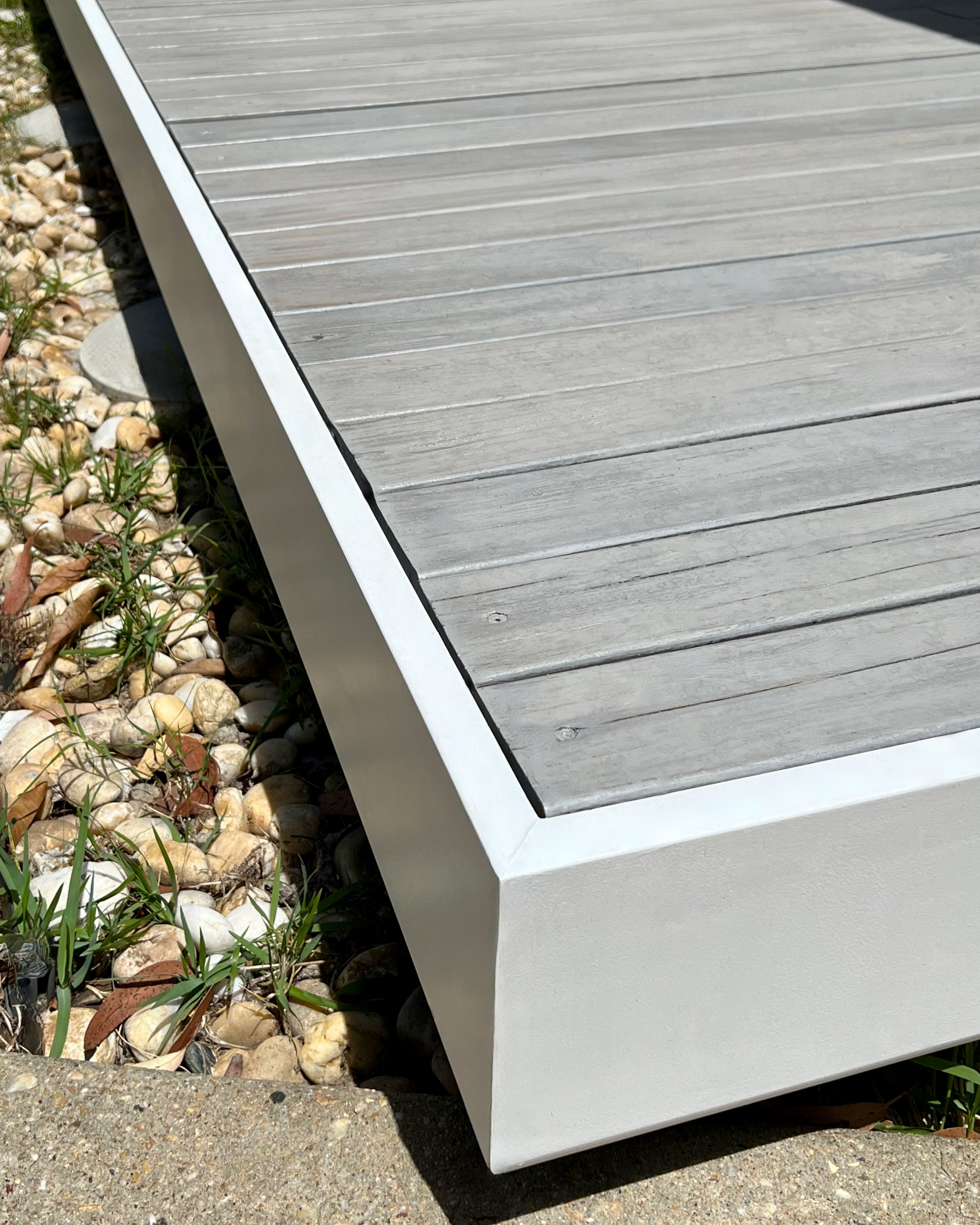How to Choose the Right Materials for Your Deck Installation Job
Choosing the proper products for your deck installment task can appear difficult. There are many variables to take into consideration, from longevity and upkeep to aesthetic appeals and ecological influence. The selection in between conventional wood and composite materials, each with its very own set of benefits and downsides, can be especially tough. The key is to stabilize your spending plan, layout choices, and way of life needs to create a deck that will boost your exterior room for years to come.
Comprehending the Different Kinds of Deck Products
When starting a deck installation job, the choice of products ends up being a pivotal choice. Different options are readily available, each with special qualities and visual allure. Conventional timber, for example, provides a classic, natural appearance and is normally much more cost-effective. Nonetheless, it can warp in time and requires normal maintenance. Compound materials, on the various other hand, are a blend of wood and plastic, supplying resilience and resistance to weather components. They demand less maintenance compared to wood but are generally much more expensive. Another choice is vinyl, which is basically maintenance-free and immune to pests and rot, albeit less natural-looking. By recognizing these differences, house owners can make an extra informed decision on the most ideal deck product for their specific requirements.
Assessing the Toughness and Upkeep Needs of Deck Products
Assessing the resilience and maintenance needs of deck materials is a vital step in deck setup. Resilience involves the product's capacity to withstand harsh climate condition, deterioration, and its longevity. For example, cedar and redwood are normally resistant to rot and insects, making them durable choices. On the other hand, pressure-treated wood, while durable, might need more upkeep due to its sensitivity to breaking and contorting.
Comprehending maintenance demands is just as essential. Some products need normal sealing or discoloring to maintain their appearance and stand up to moisture damages, while others, like composite decking, demand much less maintenance. By assessing these variables, one can select one of the most suitable decking product, guaranteeing an equilibrium in between resilience, upkeep needs, and aesthetic charm.
Price Analysis: Comparing Timber and Compound Decking
Although expense may originally seem like a secondary problem, it is a considerable element when contrasting wood and composite outdoor decking. On the other hand, composite decking, while costlier initially, calls for less upkeep, potentially reducing long-lasting costs. Potential deck owners need to consider their budget and desire to maintain their decks when making a decision between wood and composite outdoor decking.
Appearances and Layout Adaptability of Decking Materials
While price is an important factor to consider, the aesthetic charm and design flexibility of decking materials likewise play a significant function in the decision-making procedure. Various products provide differing degrees of aesthetic charm. All-natural timber decking offers a traditional, ageless appearance, while composite products supply a wide range of colors and textures to fit diverse tastes and styles. Design flexibility refers to the ability to shape and manipulate the decking material to meet particular design requirements. Wood, for instance, offers high layout adaptability as a result of its convenience of reducing and forming. Composite materials, while less adaptable in layout, are still versatile enough for the majority of deck styles. These elements, for that reason, are vital factors in the option of decking product.
Environmental Effect of Decking Materials
When selecting decking products, one must take into consideration not only looks and durability, however also the ecological impact. It is very important to assess the sustainability of products and explore recycled decking alternatives. Additionally, recognizing the potential effect on neighborhood environments will certainly ensure a much more eco accountable option.
Examining Product Sustainability
In the realm of deck building and construction, analyzing material sustainability is an essential step. This entails reviewing the environmental impact of each potential material, considering elements such as the energy required for its production, its carbon footprint, and its end-of-life disposal or recycling options. Timber is an eco-friendly source, yet unsustainable logging techniques can lead to logging. Additionally, composite outdoor decking materials commonly integrate wood and plastic, decreasing the demand for new timber but increasing dependence on nonrenewable fuel sources. Aluminum and various other steels may be more sturdy and recyclable, however their extraction and handling can be energy-intensive. Hence, the option of decking products ought to balance capability, appearances, expense, and sustainability to guarantee a responsible and durable setup.
Recycled Decking Choices

Composite outdoor decking is especially preferred due to its durability and ease of maintenance. Recycled plastic decking, on the other hand, is highly resilient and needs very little upkeep.

Effect On Local Communities
While the benefits of using recycled materials for decking can not be overemphasized, it's similarly click this vital to consider the broader environmental ramifications of these selections. The removal, handling, and transportation of products can exceptionally impact regional ecological communities. Logging for wood outdoor decking adds to environment loss and environment modification. Also the manufacturing of composite materials can release damaging exhausts. Alternatively, making use of recycled or sustainably sourced products can aid alleviate these results. In addition, taking into consideration the lifespan of products can lower ecological influence; longer-lasting options require much our website less constant substitute, therefore saving resources. Correct disposal of old outdoor decking is important to minimizing land fill waste. Essentially, an eco-conscious deck project needs cautious product choice, sustainable sourcing, and liable disposal.
Making Your Decision: Tips for Selecting the most effective Deck Products
As the short article transitions into the subtopic of "Making Your Decision: Tips for Selecting the Finest Deck Products", it is essential to comprehend the selection of deck materials available. Striking an equilibrium between durability and aesthetics is essential in this choice process. The adhering to discussion will direct visitors in making an enlightened choice based upon these essential factors to consider.
Recognizing Different Deck Products
The task of picking the ideal products for your deck installation can appear intimidating as a result of the substantial selection of options available. Understanding the various products can streamline this process. Wood is a preferred selection, offering a classic visual and affordability. Kinds of timber made use of consist of pressure-treated lumber, cedar, and redwood. Compound materials, made from a mix of timber and plastic, are low-maintenance and immune to rot and insects. Vinyl or PVC decks are a lot more durable and call for much less maintenance than composite materials, yet they can look much less natural. Aluminum decks are solid, light-weight, and resistant to rot, yet they are likewise the most expensive option. Each product has its own benefits and downsides, making it critical to consider your details requirements before making a last decision.
Sturdiness vs. Aesthetic Appeals Balance
Balancing longevity with aesthetic appeals can be a challenge when choosing deck products. The choice frequently steams down to individual preferences and the deck's meant usage. High-traffic locations may require long lasting products like composite decking, which endures damage yet may lack the natural appeal of timber. On the various other hand, wood provides an ageless allure and heat that synthetic view it materials struggle to replicate. It needs more upkeep and might not last as long. As a result, property owners require to strike an equilibrium, taking into consideration both the deck's practical needs and their visual choices. By doing so, they can ensure their deck stays a practical and appealing outdoor space for years to come.
Conclusion
Finally, choosing the ideal products for your deck installation job requires cautious factor to consider of factors such as sturdiness, upkeep, cost, aesthetic appeals, and ecological impact. Whether you opt for standard timber or composite products, your selection ought to line up with your budget plan, layout choices, and lifestyle. Ultimately, the ideal outdoor decking product is one that enhances your outdoor space and offers pleasure for several years ahead.